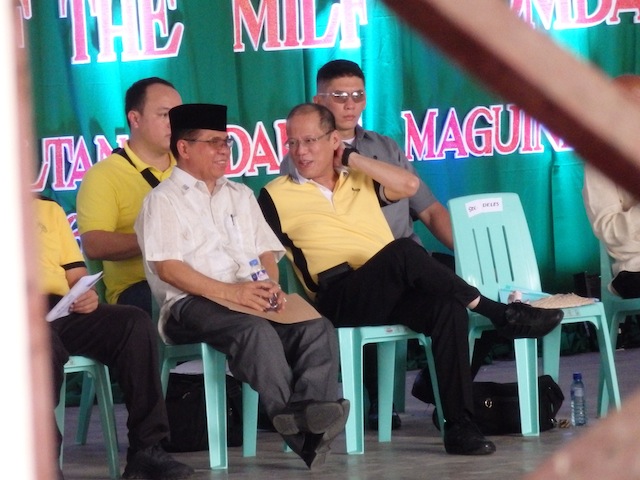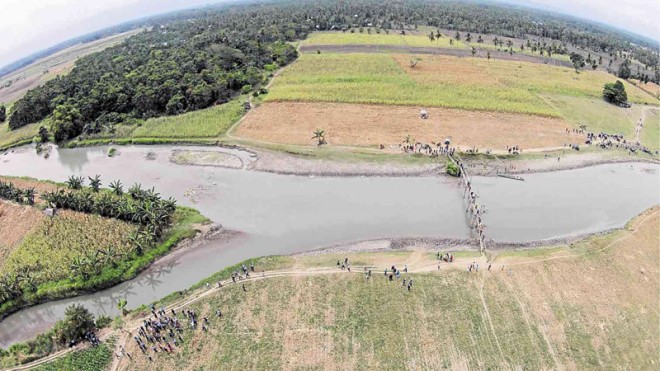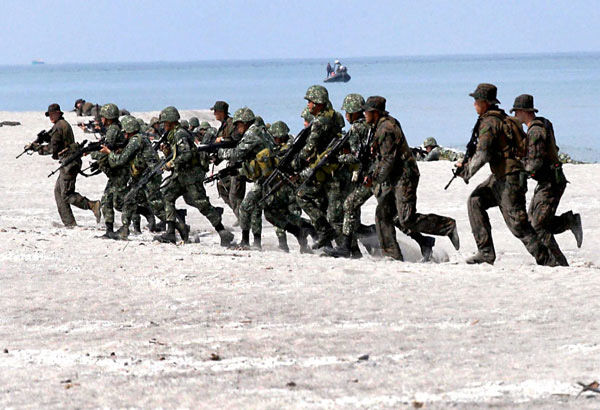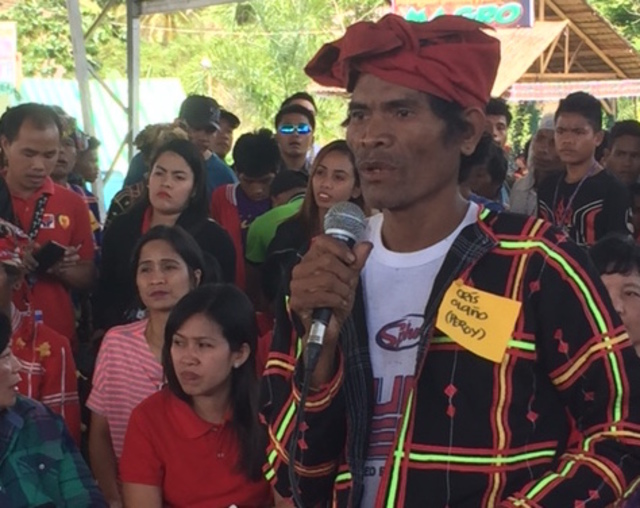From MindaNews (Jan 31):
Beyond PNoy: moving on in the Bangsamoro peace process
“The BLBAR is dead; long live the BBL!”
The Congress-proposed Basic Law for the Bangsamoro Autonomous Region (BLBAR) under the Aquino administration is dead, but the draft Bangsamoro Basic Law (BBL) of the Bangsamoro Transition Commission (BTC) will continue to live beyond the Aquino administration.
This is what lawyer Ishak Mastura, head of the Regional Board of Investments (RBOI) of the Autonomous Region in Muslim Mindanao, meant when he said “the BLBAR is dead; long live the BBL!.”
Al Haj Murad Ebrahim, chair of the Moro Islamic Liberation Front (MILF) has repeatedly said that in their present form, they would not accept the BLBAR that the House of Representatives’ Ad Hoc Committee on the BBL and the Senate Committee on Local Government substituted for the “agreed version” of the BBL because these versions envision a Bangsamoro that is “less than the ARMM (Autonomous Region in Muslim Mindanao) that it seeks to replace” and the Senate version reduces it into a mere local government unit.
In an interview on January 26, Murad reiterated earlier statements that if the BBL is not passed under the Aquino administration, they will continue, in the next administration, to demand implementation of the Comprehensive Agreement on the Bangsamoro (CAB) which the peace panels signed on March 27, 2014.
There will be no renegotiation of the CAB, he said, because it is a signed agreement, forged after 17 years of peace negotiations, and is in fact already on implementation phase, including the passage of the BBL.
 PARTNERS IN PEACE. President Benigno Simeon Aquino III and MILF chair Al Haj Murad Ebrahim on stage at the ceremonial decommissioning of MILF combatants and weapons on June 16, 2015 at the gymnasium of the old Maguindanao Capitol in Simuay, Sultan Kudarat, Maguindanao. MindaNews file photo by Carolyn O. Arguillas
He said they will not change the draft BBL for submission to the 17th Congress (2016-2019) because “it’s already an agreed version. Napagkasunduan na.”
PARTNERS IN PEACE. President Benigno Simeon Aquino III and MILF chair Al Haj Murad Ebrahim on stage at the ceremonial decommissioning of MILF combatants and weapons on June 16, 2015 at the gymnasium of the old Maguindanao Capitol in Simuay, Sultan Kudarat, Maguindanao. MindaNews file photo by Carolyn O. Arguillas
He said they will not change the draft BBL for submission to the 17th Congress (2016-2019) because “it’s already an agreed version. Napagkasunduan na.”
He said the process of passing the BBL under the next administration will not necessarily go back to zero but to square 1 as the “agreed version” of the BBL will already be ready for submission when the 17
th Congress opens and will then go through the legislative mill.
Murad said they are aware that once the draft BBL is re-filed, changes would still be made by the next Congress. “Titingnan natin kasi sa proseso, even though it’s already agreed, kung meron silang pagbabago (Let’s see because in the process, even though it’s already agreed, Congress might introduce changes).”
He said they are open to “improvements” of the draft when Congress deliberates on it, “as long as it will not contradict the CAB… as long as they will comply with the CAB.”
The “agreed version” Murad is referring to is the version drafted by the BTC which was vetted by and agreed upon with the Office of the President, the same version submitted to Congress during ceremonial rites held in Malacanang on September 10, 2014.
This draft BBL became HB 4994 and SB 2408.
After their committee hearings, however, the House of Representatives’ Ad Hoc Committee on the Bangsamoro Basic Law and the Senate Committee on Local Government, filed their respective substitute bills HB 4894 and SB 2408, both titled BLBAR.
Federalism
In September last year, when deliberations on the Bangsamoro law were already riddled with problems, former Senate President Aquilino Pimentel told MindaNews that “amending the BBL by deleting its constitutionally questionable provisions was the easier thing to do – in Congress – than to revise the Constitution” to accommodate the Bangsamoro, a regional government that will be parliamentary in form.
“But, if we are minded to revise the Constitution and offer our Muslim brethren a formula for peace and development that is widely acceptable to them as a people, we might as well propose the adoption of a federal system of government,” Pimentel, a MIndanawon and long-time advocate of federalism, said.
“For a federal system of government for the entire country would not only give the Bangsamoro peoples a chance to govern themselves according to their customs and traditions – with minimal interference by the central government, but will also give the rest of the country’s ‘federal states’ the same status without the latter’s having to rise up in arms as our Muslim brethren had to do over the centuries,” he said.
On January 13, when MindaNews asked Pimentel on the chances that Congress can still pass an “acceptable” Bangsamoro law given only nine session days left to deliberate on it, Pimentel said, “none in law that will satisfy the MILF or the other Muslim factions.”
The MILF found the BLBAR substitute bills unacceptable because it would render the Bangsamoro less autonomous than the Autonomous Region in Muslim Mindanao (ARMM). In the deliberations for what would become RA 9054 in early 2001, the Moro National Liberation Front (MNLF) also found the Congressional draft unacceptable because it would “render the ARMM less autonomous than it already was.”
Pimentel said passing a Bangamoro law in Congress “is another pointless attempt at settling the so-called ‘Moro problem’ in Mindanao.”
“Federalism is the way to go,” he said.
Only one of the four major contenders for the Presidency is espousing federalism.
Shifting to a federal form of government requires amending the 1987 Constitution.
For Dean Tony La Vina of the Ateneo School of Government, the immediate next step is “for government and MILF to negotiate a new timetable.”
The two peace panels will meet in February in Kuala Lumpur to discuss the next steps.
Let Supreme Court rule
Mastura, who earlier served as a lawyer and member of the technical working group of the MILF peace panel, told MindaNews that he believes the “BBL legislative agenda will continue even up to the next administration if there is no more time in this administration” but in the meantime, he hopes the Supreme Court would now act on the cases filed before it that questioned the constitutionality of the 2012 Framework Agreement on the Bangsamoro (FAB) and the 2014 Comprehensive Agreement on the Bangsmoro.
“In the meantime, we have to get the Supreme Court involved in jump-starting the process with a ruling on the cases against FAB/CAB so that there are no more time-consuming debates on constitutionality among the executive and legislative departments,” Mastura said.
He said his preferred mode for “next steps” in the Bangsamoro peace process is for the Supreme Court to conduct oral arguments for the cases against the FAB and CAB “and then rule on it to have the parameters and guide on the legislation of BBL that is based on CAB/FAB and to find out if indeed we need constitutional amendment for some of its provisions to be accommodated.”
“Thus, with this move or modality, the whole of government, i.e. the three branches of government — meaning the executive, legislative and judiciary — will be engaged in the Mindanao peace process,” Mastura proposed.
Lawyer Maria Asis of the Bangsamoro Study Group said the next steps would be “continuous assertion of the CAB, one arena of which is the Supreme Court.”
http://www.mindanews.com/peace-process/2016/01/31/beyond-pnoy-moving-on-in-the-bangsamoro-peace-process/





